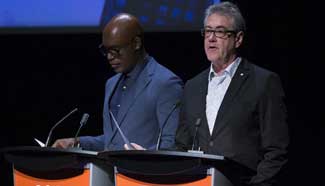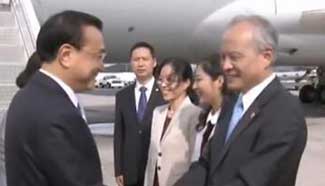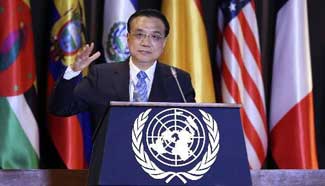CARACAS, Sept. 18 (Xinhua) -- The members of the Non-Aligned Movement (NAM), which gathered in Venezuela for their 17th Summit, took a united line on many of the problems affecting the world, including UN reform and terrorism.
UN REFORM
During a debate ahead of the much awaited Margarita Declaration which will be delivered as the Summit closes on Sunday evening, ministers from around the world said that they felt the UN needed to become more relevant for all its members.
Bounkeut Sangsomsak, minister to the Prime Minister's Office of Laos, said that the NAM needs to precisely "identify" its agenda on how to reform all bodies of the UN.
"The Movement must not limit itself to just some of the organisms of the UN," he said.
In terms of the internal affairs of the NAM members, Sangsomsak said that solidarity should be strengthened "to defend the noble principles of our founding fathers. Only in this way...can the NAM recover its historic credibility."
Lenkon Tao Bruno, foreign minister of Vanuatu, also emphasized that "global problems requires global solutions" and that "the UN must be reformed in order to be more effective in dealing with this."
He said this would help ensure international cooperation in tackling various challenges, such as climate change.
Alejandro Evuna Owono, minister to the presidency in charge of missions of Equatorial Guinea, called it imperative to bring about a new international order in which the NAM "plays a fundamental role" and maintains itself "at the forefront of new multilateral mechanisms."
"It is evident that this reform depends on the establishment of a new international order...in which our movement must act with full confidence," said Evuna Owono.
According to the diplomat, it is important that the NAM becomes part of "a more dynamic and proactive outlook," in order to face "the (global) problems we currently face."
Finally, minister of foreign relations of Bangladesh, Shahriar Alam, called for "global governance to be strengthened" as the world is undergoing "a time when the global community is undergoing a paradigm shift."
TERRORISM & WORLD PEACE
Alam is also in charge of the NAM's affairs in fighting terrorism and extremism.
"The people of many countries are suffering from extremist actions such as terrorism which we must defeat to reach global peace," he said.
Alam encouraged the NAM to strengthen South-South cooperation, boost its ties with the G77+China, and establish secure channels for migration.
The Minister of Climate Change and Environment of the United Arab Emirates (UAE), Thani Ahmed Al Zeyoudi, called on the members to work hand in hand to end armed conflicts.
Al Zeyoudi rejected foreign interference in countries' internal affairs, which threatens stability and sovereignty, while urging the NAM members to respect these principles.
"It is crucial that the NAM seeks a peaceful solution in the Middle-East...and counter the scourge of terrorism and extremism," he said.
INTERFERENCE
Another hot topic during the summit was interventionism, which was denounced by the foreign minister of Burundi, Alain Aime Nyamitwe, who slammed attempts to foster coups or to interfere in other states.
"Non-Alignment is a recognition that all the people of the world are equal and can create a better world. Political independence and sovereignty...are founding values of the NAM. Our people have been attacked by coup attempts which seek to topple our legitimate government," he said.
In the same line, Hernani Coelho, foreign minister of Timor-Leste, called on member countries to remain vigilant in order to re-establish sovereignty as the legitimate right of all nations.
"Many of the new NAM members are free and independent countries which were former colonies of Western powers. However, our work is not finished. We are still facing the challenges of our founders and we must keep alive the spirit of the movement and improve solidarity between each other," he said.
NUCLEAR DISARMAMENT
On the same day, the UN thanked the NAM for its efforts in ensuring nuclear disarmament and preserving world peace.
Speaking at the Summit, Kim Won-soo, the UN's High Representative for Disarmament Affairs, thanked the NAM for helping the United Nations "in all these causes."
He said that nations with powerful weapons must "guarantee the total implementation of their disarmament commitments" while calling on all states "to sign and ratify" all instruments related to nuclear disarmament.
According to Kim, the creation of a safer and better world for all requires inclusive efforts from interested parties.
In recognizing the NAM's contribution to these goals, he highlighted how "the Movement's initiative to hold the first meeting of the (UN) General Assembly on disarmament and establish Sept. 26 as the International Day for the Total Elimination of Nuclear Weapons has helped to maintain global attention on this essential topic."
Founded in Belgrade in 1961, the NAM is a group of states that are not formally aligned with or against any major power bloc. As of now, the group has 120 members, 17 observer states and 10 observer organizations.










